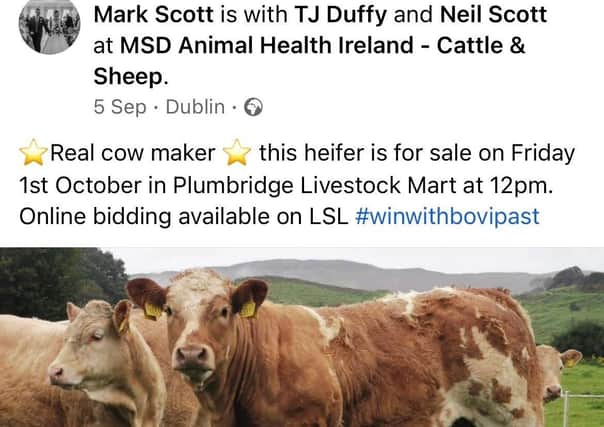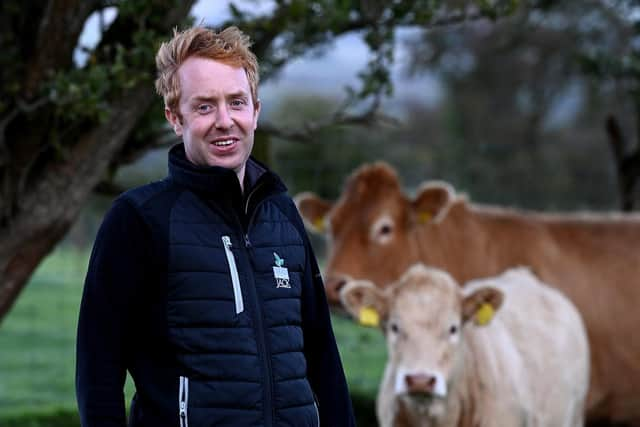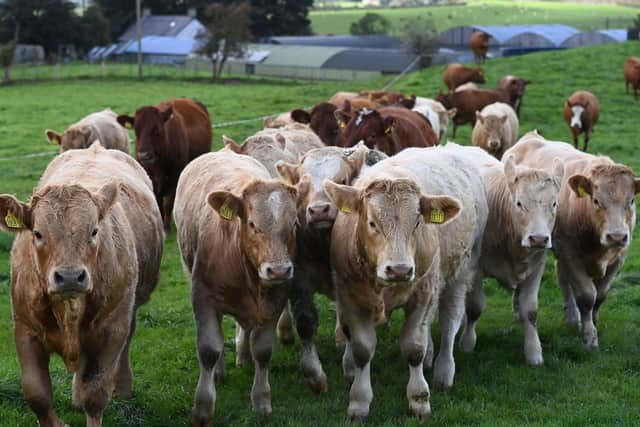Winner announced for the #WinWithBovipast competition


Mark farms 60 suckler cows and 260 breeding ewes along with his brother in Gortin, Co. Tyrone.
They keep mostly Charolais bulls and heifers are AI-ed with sexed semen. Cows are a Salers-Limousin cross, producing golden coloured weanlings which prove popular at local marts.
Advertisement
Advertisement
Mark was recently recognised for the quality of his ‘best beef weanling’, winning the MSD Animal Health ‘#WinWithBovipast’ online competition, picking up a prize of Balmoral tickets, a quilted adult Toggi jacket and brown leather Blundstone boots.


Mark commented: “We take pride in the health and quality of our animals, so being recognised for our best beef weanling was a real boost! I was also delighted to get back to the Balmoral Show this year with a few friends after missing it last year.”
Both Mark and his brother hold full time jobs and farm part time, which means they don’t have time to take chances when it comes to animal health.
Mark explained, “We have enough to deal with without having to cope with sick animals. Taking a preventative approach means we have peace of mind that there is less of a risk dealing with costly disease outbreaks.”
Advertisement
Advertisement
Mark works closely with Strule Veterinary Services based in Newtownstewart, taking their advice and adopting a strict vaccination protocol to protect animal health. Cows are vaccinated with Rotavec Corona 4 to 12 weeks before calving. Weanlings are vaccinated with Bovipast® RSP before housing followed by a booster shot four weeks later, ensuring they are protected from bovine respiratory disease during the period when they are most at risk. All cows are vaccinated against IBR, Leptospirosis and BVD too.


Mark continued: “We’ve had a few issues with pneumonia in the past which proved hugely costly in terms of antibiotic treatment. We were lucky not to lose any animals, but we came very close. Dealing with sick animals was a major drain on our time and on our limited resources. The stress and hassle of disease is simply the last thing we need, especially when it can easily be prevented.
“I’ve heard of a few farmers being caught out with bad cases of pneumonia spreading throughout the herd, suffering many losses. It’s not worth the risk and my advice would be to talk to your vet and invest in the vaccines instead of being at risk to very costly outbreak.
“We wean calves outside in the fresh air, as it’s less stressful for them than being indoors. The calves run beside cows for a day or two before we bring them in, and we gradually introduce concentrate before housing them. When we sell the animals at the local livestock mart, they know they’ll be getting stock in prime health from us - fully up to date with all vaccinations.
Advertisement
Advertisement
“We have expanded in the last year from 50 to 60 cows, and part of this has involved investing in a new shed. Looking forward we want to keep reducing costs and improving quality, and animal health is a key element of that. A preventative approach to disease means we have more control over costs, and we can plan with more certainty,” Mark concluded.